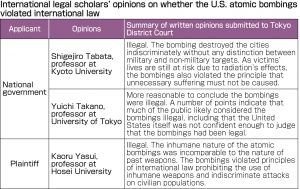Striving to fill voids in Hiroshima, unfinished judgment, Part 10: Legal experts’ opinions on atomic bombings
May 2, 2024
Japanese government-approved legal scholars considered bombings to be “illegal”
At the core of the “A-bomb trial” were assessments made about international law, something Japanese courts did not typically handle. When the Tokyo District Court began oral arguments in 1960, five years after the lawsuit was first filed, the court asked three scholars of international law to provide expert written opinions. One of the scholars had been selected through application by the plaintiff, and the other two were selected through application by the Japanese government, which was the defendant in the case.
Bombings called out for being indiscriminate attacks
The most critical point in the expert opinions was whether or not the dropping of the atomic bombs on Hiroshima and Nagasaki represented a violation of international law. The three scholars each wrote their own opinions on the matter.
Kyoto University Professor Shigejiro Tabata, who died in 2001 at the age of 89, was one of the legal experts approved by Japan’s national government. Mr. Tabata’s written opinion stated that the bombings had been illegal. Mr. Tabata was a leading scholar of international law in Japan. Serving as an examiner for the country’s diplomatic service oral exams for many years, he interviewed the current Empress of Japan, a former diplomat representing the country, in 1986.
Mr. Tabata rejected the Japanese government’s argument in support of consideration of the bombings as having been legal based on the claim that there had been no international law directly prohibiting use of atomic bombs in place at the time. On the basis of the principles of the Convention respecting the Laws and Customs of War on Land (the Hague Convention), he noted that the atomic bombings of Hiroshima and Nagasaki constituted indiscriminate attacks that illegally caused damage to non-military targets.
He also emphasized that, “A-bomb survivors still today not only suffer the tragic fate of radiation’s effects but are also in danger of losing their lives.” He concluded that the bombings fell under the convention’s prohibition against use of “weapons that cause unnecessary suffering.”
Reality of atomic bombings also serve as foundation
Yoshiro Matsui, 83, an international legal scholar who was once a student of Mr. Tabata, described his former teacher. “Mr. Tabata seemed to have thoroughly studied the issue of nuclear weapons in order to submit his opinion. Even in his lectures, he would passionately speak on issues of related international law.” In his written opinion, Mr. Tabata referred to A-bomb damage survey reports, with his recognition of the reality of the atomic bombings underpinning his assessment.
Meanwhile, regarding the right to demand compensation for damages caused by the bombings, Mr. Tabata expressed the opinion that individual victims were generally not allowed to seek compensation against adversarial nations, except for exceptions recognized in certain treaties. The plaintiffs sought compensation from the Japanese government for its act of waiving the right to demand compensation from the United States, but Mr. Tabata’s point that there was no right to be waived in the first place led ultimately to the court’s decision to dismiss the case.
Mr. Matsui said, “I believe his judgment was unavoidable, but he must have felt bad about it.” As a result, Mr. Tabata’s opinion was the most frequently quoted in the court’s ruling.
University of Tokyo Professor Yuichi Takano, who died in 2004 at the age of 87, also provided his written opinion as an expert recognized by Japan’s national government, noting that “it is more reasonable to conclude the bombings were illegal.” Mr. Takano’s opinion failed to support the government’s claim.
The legal scholar approved on the plaintiff’s side was Hosei University Professor Kaoru Yasui, who was deeply engaged in campaigns against atomic and hydrogen bombs and died in 1980 at the age of 72. He asserted that the dropping of the atomic bombs violated international law, claiming that Japan’s government bore liability for compensation.
By January 1963, the three experts’ written opinions had been submitted in succession. In March of that year, final oral arguments for the case took place based on the opinions and, with that, the trial concluded. The three judges presiding over the case began their deliberations to write a verdict.
(Originally published on May 2, 2024)








